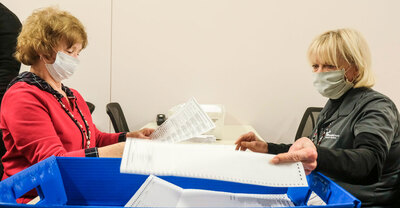Perhaps you saw a blurb in the news recently about the 40th anniversary of the eruption of Mount St. Helens. This geological event shed a huge amount of light on how catastrophes can reshape the surface of the earth very quickly. In fact, what we have learned from this "test lab" event destroys the uniformitarian assumptions of evolutionary geologists.
Remember this: without millions of years the theory of evolution is nothing but rubble. The eruption of Mount St. Helens and the corresponding geological events that occurred as a result provide real time observable events demonstrating how a large catastrophe creates geological features very quickly. Thus, the assumption of millions of years of earth history is an error. It is only needed by those who wish to explain away the history recorded in the book of Genesis (chapters one through nine).
Here is a quote from Ken Ham of Answers in Genesis in a recent blog:
What does Mount. St. Helens have to teach us today? Well, like I mentioned, this geologic event was highly significant. It allowed geologists to study, in real time, how a catastrophe can radically shape the environment. Geologists observed the largest landslide on record, massive ash clouds cooling the global temperature by a fraction of a degree, sedimentary layers rapidly forming, bark peat forming from trees washed into nearby Spirit Lake, vertically floating trees being partially buried in this same lake, and mudslides carving out a canyon 1/40th the scale of Grand Canyon!
In other words, they observed processes that secular geologists claim take long ages happen extremely quickly because of a catastrophe (e.g., formation of peat, deposition of sedimentary layers, carving of canyons, etc.). Now, this catastrophe seems very large to us, but compared to catastrophes (including volcanic eruptions) of the past, this was a relatively small event.
This example reminds us that slow and gradual processes are not the best way of looking at the world around us. Most geologists today operate from the mindset of “the present is the key to the past.” They look at the world around us and, based on the slow and gradual processes of the present, they attempt to figure out what happened in the past. But this approach ignores how catastrophes can rapidly accomplish what appears to have taken long ages. Mount St. Helens is a perfect example of this!
I hope you will click on the link to more information about Mount St. Helens at the end of the paragraph above. This link connects you with a more detailed discussion of lessons learned from that catastrophe 40 years ago.
Most importantly, you need to have full confidence in the inspired Word of God. The history of the Bible is absolutely trustworthy and so is the gospel of Christ rooted in that history.
Remember this: without millions of years the theory of evolution is nothing but rubble. The eruption of Mount St. Helens and the corresponding geological events that occurred as a result provide real time observable events demonstrating how a large catastrophe creates geological features very quickly. Thus, the assumption of millions of years of earth history is an error. It is only needed by those who wish to explain away the history recorded in the book of Genesis (chapters one through nine).
Here is a quote from Ken Ham of Answers in Genesis in a recent blog:
What does Mount. St. Helens have to teach us today? Well, like I mentioned, this geologic event was highly significant. It allowed geologists to study, in real time, how a catastrophe can radically shape the environment. Geologists observed the largest landslide on record, massive ash clouds cooling the global temperature by a fraction of a degree, sedimentary layers rapidly forming, bark peat forming from trees washed into nearby Spirit Lake, vertically floating trees being partially buried in this same lake, and mudslides carving out a canyon 1/40th the scale of Grand Canyon!
In other words, they observed processes that secular geologists claim take long ages happen extremely quickly because of a catastrophe (e.g., formation of peat, deposition of sedimentary layers, carving of canyons, etc.). Now, this catastrophe seems very large to us, but compared to catastrophes (including volcanic eruptions) of the past, this was a relatively small event.
This example reminds us that slow and gradual processes are not the best way of looking at the world around us. Most geologists today operate from the mindset of “the present is the key to the past.” They look at the world around us and, based on the slow and gradual processes of the present, they attempt to figure out what happened in the past. But this approach ignores how catastrophes can rapidly accomplish what appears to have taken long ages. Mount St. Helens is a perfect example of this!
I hope you will click on the link to more information about Mount St. Helens at the end of the paragraph above. This link connects you with a more detailed discussion of lessons learned from that catastrophe 40 years ago.
Most importantly, you need to have full confidence in the inspired Word of God. The history of the Bible is absolutely trustworthy and so is the gospel of Christ rooted in that history.


 RSS Feed
RSS Feed